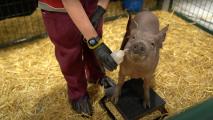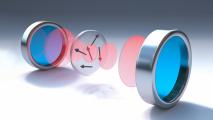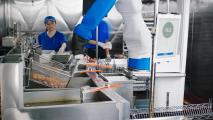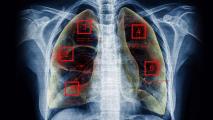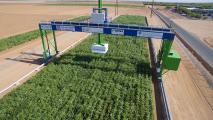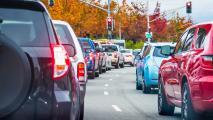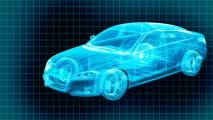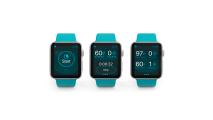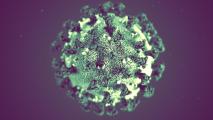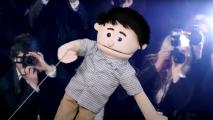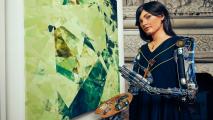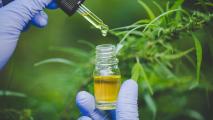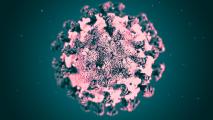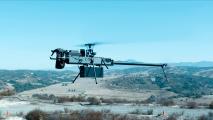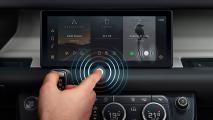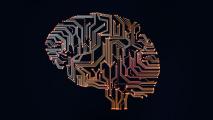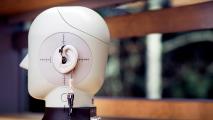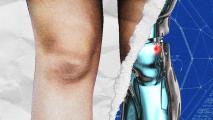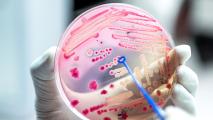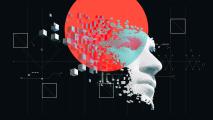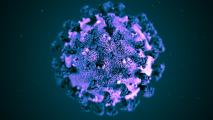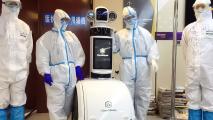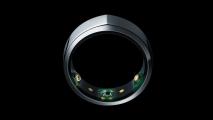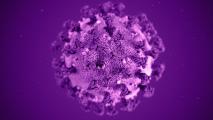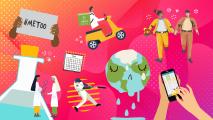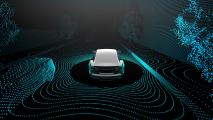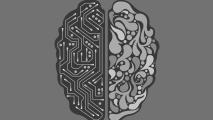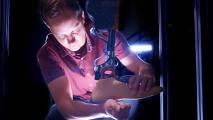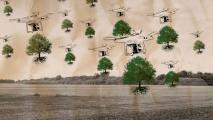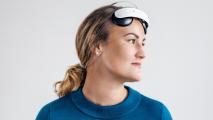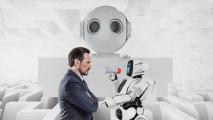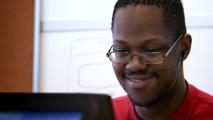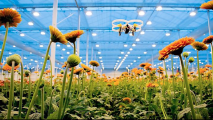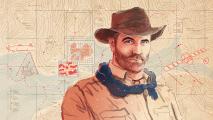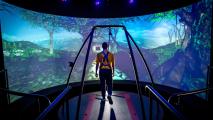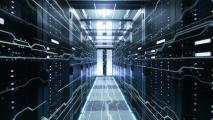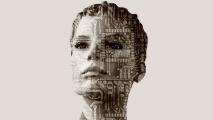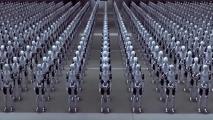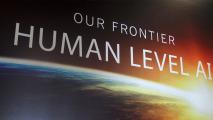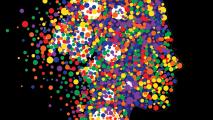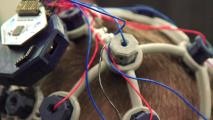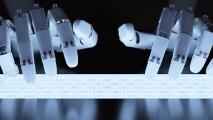Showing 687 results
New test can show if you’ve had COVID-19, even if antibodies fade
The FDA has approved a T cell test for COVID, a first-of-its-kind assay that looks to the immune system’s memory.
New VR movie lets you play god to a planet of AIs
In the new VR movie “Agence,” artificially intelligent characters respond to the actions of the viewer in unpredictable ways.
U.S. troops test wearables for early detection of COVID-19
The Department of Defense wants to use wearable sensors, Dutch AI, and thousands of personnel to develop markers for early detection of COVID-19.
Series|
Just Might Work
How robots could end animal captivity in zoos and marine parks
Could robotic dolphins help marine parks become more humane spaces where people can learn about and connect with nature?
Robot lawyer helps people connect with incarcerated loved ones
DoNotPay’s robot lawyer can now help people write and send letters to inmates without worrying about violating a facility’s mail rules.
Your voice could help train an AI to detect coronavirus
The Corona Voice Detect project is developing an AI-powered system to detect coronavirus infections based on a sample of a person’s voice.
A French company is building the world’s biggest insect factory farm
Ÿnsect is building the world’s largest insect farming facility in Amiens, France. The mealworms grown there may end up feeding your pets and the salmon on your plate.
Elon Musk: Neuralink brain implant detects pigs' movements
During a livestream, CEO Elon Musk presented the latest Neuralink brain implant, as well as what he claimed were several pig recipients of the device.
Scientists create modem for future quantum internet
Physicists have created a modem for the quantum internet of the future, giving powerful quantum computers a way to share information.
These chatbots provide genetic counseling services
Genetic counseling services are in high demand. Now, chatbots are providing some of those services, helping patients navigate DNA testing.
Robot cook could help restaurants recover from COVID-19
Miso Robotics is making Flippy ROAR available for $30,000 in the hopes the robot cook will help the restaurant industry recover from the pandemic.
Predicting which birds can cause Lyme disease spread
Lyme disease spreads via infected ticks, some of whom pick it up from birds. But which birds may carry the disease to new places?
This may be the 3D-printed submarine of the future
Using unique construction techniques, this 3D-printed submarine may set the pace for the building of large AUVs to come.
Building infrastructure on Mars is tricky — these bugs could help
Landing on Mars is just the beginning — to live there, we'll need to invent Martian concrete.
Computer scientists build new tool to fight coronavirus
Computer scientists are using AI and text mining to sort through thousands of coronavirus research papers that could help fight the disease.
AI can detect coronavirus infections far faster than humans
New artificial intelligence systems can detect coronavirus infections far faster than human doctors and could help end the COVID-19 outbreak.
This massive farm robot is helping secure the future of food
A massive farm robot is analyzing crops in Arizona, helping identify ones that could grow in hotter climates to help secure the future of food.
This robot dolphin could free animals from captivity
This robot dolphin could replace the real ones forced to entertain people at marine park exhibits across the globe.
Smart traffic lights ease congestion on city streets
Smart traffic lights by startup NoTraffic use AI to improve the flow of traffic in cities, minimizing carbon emissions and delays for first responders.
Can a connected city stop car crashes?
In partnership with Ford
One of the largest automotive makers in the world is ushering in the future of mobility, using AI and machine learning to help cities prevent traffic collisions and build smart transportation systems.
This model may help predict wildfires
Wildfires need dry fuel to thrive. Researchers at Stanford are working on an AI model to measure dryness to help predict, and control, the blaze.
Stopping nightmare disorder with a prescription-only watch
A prescription-only watch that treats nightmare disorder is the latest in a growing subset of health technologies called prescription digital therapeutics.
Japan ends state of emergency, seniors DJ from home, and more
In our weekly news roundup, we take you inside the fight against COVID-19 to explore the solutions on the frontlines of an unprecedented global response.
Deepfakes shine in South Park creators’ new show
The creators of South Park have released a web show, Sassy Justice, that makes use of incredibly realistic deepfakes.
Robot artist challenges our definition of art
Artists have a history of subverting expectations and mainstream culture, but the world’s first humanoid robot artist is taking it to a new level. So far, she has sold over $1 million worth of art.
Can CBD be the next superbug slayer?
In the search for new weapons against superbugs, CBD and antibiotics in combination, as well as CBD alone, may prove to be promising candidates.
New brain implant reads minds from inside a blood vessel
A first-of-its-kind neural interface called the Stentrode sits in a blood vessel in the brain, picking up signals it can wirelessly transmit to a computer.
Using smartphone cameras to detect diabetes
A new algorithm can detect diabetes using data collected by a smartphone’s camera, offering a way to address the problem of undiagnosed diabetes.
The material that could help humans become cyborgs
Coating implantable electronics in the polymer PEDOT can extend their life, which could make cyborgs more common in the future.
Contact-tracing tech advances, the new saliva test, and more COVID-19 updates
In our weekly news roundup, we take you inside the fight against COVID-19 to explore the solutions on the frontlines of an unprecedented global response.
“Antivitamins” could be the cure for antibiotic resistance
The B1 antivitamin helps bacteria kill competing bacteria, leading researchers to suspect it could help us fight antibiotic resistance and superbugs.
A health app could someday detect heart disease via selfies
Researchers in Beijing created a new deep learning algorithm, which claims to detect signs of heart disease in the human face.
Can a robot really freestyle?
Engineers at the Georgia Institute of Technology have designed the first robot capable of not only playing music, but creating it.
Engineering the impossible: The future of military tech
In partnership with Anduril
Palmer Luckey and his team of outside-the-box thinkers are creating defense technology that the government does not yet believe possible.
“Touchless touchscreen” could reduce distracted driving
New “predictive touch” tech could help prevent distracted driving by limiting the amount of time drivers spend interacting with vehicle displays.
You can now order a 3D printed, mind-controlled prosthetic arm
By scanning amputees’ limbs with a 3D scanner, Unlimited Tomorrow is making custom prosthetic arms that can be controlled with the mind.
AI device helps wheelchair users control their world
These assistive devices are equipped with 360 cameras and eye-tracking technology to help those with mobility and speech impairments find independence.
A humanlike brain means this smart robot can see, feel, and think
A smart robot that uses neuromorphic computing, may one day “think” like humans.
These are the medical breakthroughs that inspired us in 2020
2020 has put medicine to the forefront like never before. Freethink’s B. David Zarley looked back on the year and chose three medical developments that inspired him.
Facebook's new augmented reality glasses will turbocharge hearing
Facebook released details of augmented reality glasses that can tune out the real world and make computer-generated sounds seem real.
Building an artificially intelligent, open-source prosthetic leg
We've come a long way since the first prosthetic leg, and "smart" limbs, equipped with computing capabilities and...
Is it possible to predict the next black swan event?
Extremely rare but massively disruptive, no one sees a black swan event coming. But researchers are building a method that may change that.
AI helps scientists discover powerful new antibiotic
Using a computer model powered by artificial intelligence, researchers at MIT have identified several promising candidates for powerful new antibiotics.
Series|
Uprising
Nick Bostrom on superintelligence and the future of AI
Beyond the brains of even the most intelligent human beings lies artificial superintelligence, which could pose serious threats to the human race. Nick Bostrom is attempting to fathom the unfathomable so we can be ready.
Human challenge trials, schools reopening, and more COVID-19 updates
In our weekly news roundup, we take you inside the fight against COVID-19 to explore the solutions on the frontlines of an unprecedented global response.
High-tech art exhibit looks at life through the eyes of AI
In this Chicago museum, artists explore some of the most polarizing forms of imagery at the moment: surveillance and facial recognition.
The coronavirus hospital staffed by robots
A robot-run coronavirus hospital in Wuhan, China, is just one remarkable example of how technology is helping combat the global COVID-19 outbreak.
Wearables can detect coronavirus symptoms early
A study involving more than 600 people found that the Oura Ring wearables can detect coronavirus symptoms 72 hours prior to onset with 90% accuracy.
How a paralympic swimmer helps advance AI bionic limbs
Morgan Stickney shares about her experimental Ewing amputations and training for the 2024 Paralympics.
Doctors use AI to test new coronavirus treatments on patients
The University of Pittsburgh Medical Center launched a new trial that uses artificial intelligence to test promising coronavirus treatments as quickly as possible.
The daily coronavirus news roundup – thursday, march 26th
An app that can help trace transmission, a 30-minute diagnostics test, and other fresh coronavirus news updates.
Freethink recognized with 11 Telly awards
This year, Freethink was honored to receive 11 Telly Awards for excellence and creativity in storytelling.
9 ways the 2010s decade changed the world
From Tinder to CRISPR, these are the top moments, movements, and ideas through which the 2010s decade shaped the world as we know it.
In the midst of a crisis, Venezuelans are training self-driving cars
Hundreds of thousands of formerly middle class Venezuelans, thrown into poverty by economic collapse, are now sitting at computers as they help train self-driving cars to identify and avoid obstacles.
Coronavirus volunteers are using tech to help their communities
Groups looking for ways to help during COVID-19 are turning to tech, using websites, spreadsheets, and online forms to mobilize coronavirus volunteers.
Exploring the ocean floor with autonomous underwater vehicles
Efficient, autonomous, and economical, the AUV is quickly becoming essential for underwater research.
Scientists are using AI to improve breast cancer screening
Computer scientists at MIT created a new algorithm for breast cancer screening to predict whether a patient will develop the disease in the next 5 years.
The anti-facial recognition fashion statement
These designers are trying to outsmart surveillance systems with anti-facial recognition makeup, glasses, and clothing. Can they help us go incognito?
How the technology behind deepfakes can help us create a better world
Deepfakes have ignited fierce media criticism and call into question the public’s ability to discern fact from...
Reminiscence therapy is helping seniors at “dementia villages”
At a growing number of “dementia villages,” staff members use reminiscence therapy to help seniors return to a time when they felt happy and safe.
China is responding to the coronavirus in a way only China could
China is using its vast surveillance network and near-total control over citizens to respond to the COVID-19 coronavirus outbreak in a way perhaps no other nation could.
Series|
Superhuman
The emerging cyborg
Alec McMorris is testing one of the world’s most advanced prosthetics - an AI powered bionic leg.
Tree-planting drones restore charred forests
This Seattle startup is bringing new life to charred forests by releasing swarms of smart, tree-planting drones equipped with seeds, mini seedbeds, and cameras.
Treating depression at home with a tDCS headset
At-home tDCS headsets are helping people treat their depression without having to go to a doctor’s office.
Trash-talking robots get under our skin
Can robots control us? Probably not, but they can influence our actions, as this recent study on human-robot interaction by Carnegie Mellon shows.
Series|
Guardians of the Apocalypse
Could the human race survive a supervolcano?
The eruption of Mount Tambora pushed humanity to the brink of extinction. Today, active supervolcanoes still have the power to nullify our future. What can we do to prepare?
Can people with autism help create next-generation AI?
Daivergent is a new startup that hires people with autism to train artificial intelligence - and helps them start independent careers.
Learning from disaster: An interview with Bryan Walsh
Human history is dotted with pandemics. We spoke with "End Times" author Bryan Walsh on how we can learn from them for the future.
Series|
Future of Food
A look inside farms of the future
With a growing population, changing consumption behavior and a climate crisis, how will we feed our future world?...
The tech that’s revolutionizing archeology with Josh Gates
In our interview with renowned adventurer Josh Gates, the host of Expedition Unknown discusses the beautiful connection between tech and archaeologists.
The first GMO salmon is coming to a store near you
After a 30-year struggle, Atlantic salmon modified with a growth hormone gene from Chinook salmon has been approved by the FDA. Its producers say it solves problems related to climate change, ocean pollution, and food scarcity. Skeptics call it playing god. Both call it the Frankenfish.
Is the future of therapy… virtual? A look into virtual reality therapy
The immersive world of VR may have therapeutic benefits for people combating phobias, anxiety, and PTSD.
Ship’s logbooks are the first records of climate change data
With the weather and ice data from old ship’s logs, Dr. Kevin Wood realized it was possible to reconstruct the history of sea ice in the Arctic to better understand climate change.
Saving lives with AI
In partnership with Intel
Artificial intelligence can find hidden patterns in patient’s vital signs - and stop emergencies before they happen.
Is autism a mysterious medical condition or part of the spectrum of human diversity?
Rethinking Autism: Interview with NeuroTribes Author Steve Silberman
AI will make you smarter
Artificial intelligence will multiply your own intelligence, in ways that will surprise you.
AI could replace chemical testing on animals
Scientists have developed software that could save one billion dollars (and two million animals) each year.
FDA approves AI “doctor” that can see disease in your eyes
How will artificial intelligence transform medicine?
Series|
Coded
How AI could revolutionize coffee
Could the blockchain be used to make fair trade goods live up to their promise?
You should start learning about artificial intelligence. Here's how.
There are a lot of different levels of artificial intelligence being applied in a lot of different ways. Here's a...
Meet the startup developing human-level artificial intelligence
The story of Vicarious' mission to build the world's first human-level artificial intelligence and use it to help...
This week in ideas: Building a cheaper MRI, reconciling God and AI, and the next Einstein
Rethinking the MRI machine, how will Christianity handle advanced tech, and is this 7-year-old the next Einstein?
Five insights: Scott Phoenix on creating AI and building a company around a crazy idea
Scott Phoenix, founder of Vicarious, shares insights on the development of artificial intelligence and why this is...
Series|
Challengers
Can AI solve our biggest problems?
Vicarious believes smart machines could solve virtually every problem humans can’t.
This week in ideas: Fighting addiction with implants, using VR to educate, Amazon Prime gets primer
An arm implant to treat opioid addiction, teaching hair stylists with VR, and a potential Amazon Prime game changer.
Can tech giants get ahead of AI?
Companies gather to discuss impact of A.I. A possible neural lace breakthrough. And unmanned cargo ships. This is...
This computer can write 2,000 snarky articles per second
What does it mean for the future of journalism when a computer can turn mounds of data into a cohesive narrative?







